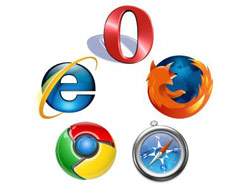You may remember that earlier this year Opera Software complained about the fact that Microsoft doesn’t offer its customers much of a choice by bundling the Internet Explorer (IE) browser with the Windows operating system. The European Commission (EC) launched an antitrust investigation into how Microsoft runs its business. To appease the EC, Microsoft thought of multiple solutions:
1. First it thought it a good idea to market Windows 7 E in Europe. This was supposed to be Windows 7 without Internet Explorer. But for the regular user, not having a browser at all was much more of a pain than using IE. So that idea was quickly canned.
2. Microsoft then proposed to continue bundling IE with Windows; but to offer more choice, the operating system would come with a ballot screen. Basically the user would be presented with a list of browsers that he could install and use. The EC thought this idea could work and let Microsoft market test the browser ballot screen – even thought Mozilla wasn’t happy with the ballot screen’s preliminary design.
The European Commission has now announced that it accepted Microsoft’s ballot screen proposal; and thus the antitrust case has come to an end. European users that have Windows and IE set as the default browser will be presented with a ballot screen (Microsoft calls it choice screen) that lists the 5 most popular browsers on the market to date: Apple’s Safari, Google’s Chrome, Microsoft’s Internet Explorer, Mozilla’s Firefox, and Opera’s, well, Opera browser. Please note that the ballot will list a total of 12 browsers. Microsoft will use the ballot screen in Europe for a period of 5 years.
And now, statements from the involved parties:
1. First it thought it a good idea to market Windows 7 E in Europe. This was supposed to be Windows 7 without Internet Explorer. But for the regular user, not having a browser at all was much more of a pain than using IE. So that idea was quickly canned.
2. Microsoft then proposed to continue bundling IE with Windows; but to offer more choice, the operating system would come with a ballot screen. Basically the user would be presented with a list of browsers that he could install and use. The EC thought this idea could work and let Microsoft market test the browser ballot screen – even thought Mozilla wasn’t happy with the ballot screen’s preliminary design.
The European Commission has now announced that it accepted Microsoft’s ballot screen proposal; and thus the antitrust case has come to an end. European users that have Windows and IE set as the default browser will be presented with a ballot screen (Microsoft calls it choice screen) that lists the 5 most popular browsers on the market to date: Apple’s Safari, Google’s Chrome, Microsoft’s Internet Explorer, Mozilla’s Firefox, and Opera’s, well, Opera browser. Please note that the ballot will list a total of 12 browsers. Microsoft will use the ballot screen in Europe for a period of 5 years.
And now, statements from the involved parties:
- Competition Commissioner for the EU, Neelie Kroes: “Millions of European consumers will benefit from this decision by having a free choice about which web browser they use. Such choice will not only serve to improve people’s experience of the internet now but also act as an incentive for web browser companies to innovate and offer people better browsers in the future..”
- Senior Vice President and General Counsel with the Microsoft Corporation, Brad Smith: “The Web browser measures cover the inclusion of Internet Explorer in Windows for users in Europe—specifically the region known as the European Economic Area, which includes 30 nations. Under today’s resolution, Microsoft commits that PC manufacturers and users will continue to be able to install any browser on top of Windows, to make any browser the default browser on new PCs, and to turn access to Internet Explorer on or off. In addition, Microsoft will send a “browser choice” screen to Windows users who are running Internet Explorer as their default browser. This browser choice screen will present a list of browsers, making it easy for users to install any one of them. It will be provided both to users of new computers and to the installed base of Windows XP, Windows Vista, and Windows 7 computers in Europe where Internet Explorer is set as the default browser.”
- CEO of Opera Software, Jon von Tetzchner: “This is a victory for the future of the Web. This decision is also a celebration of open Web standards, as these shared guidelines are the necessary ingredients for innovation on the Web. Opera has long been at the forefront of Web standards, which ensures that people have equal access to the Web anytime, anywhere and on any device. We see the outcome of the EU’s investigation as a testament to our mission.”

























